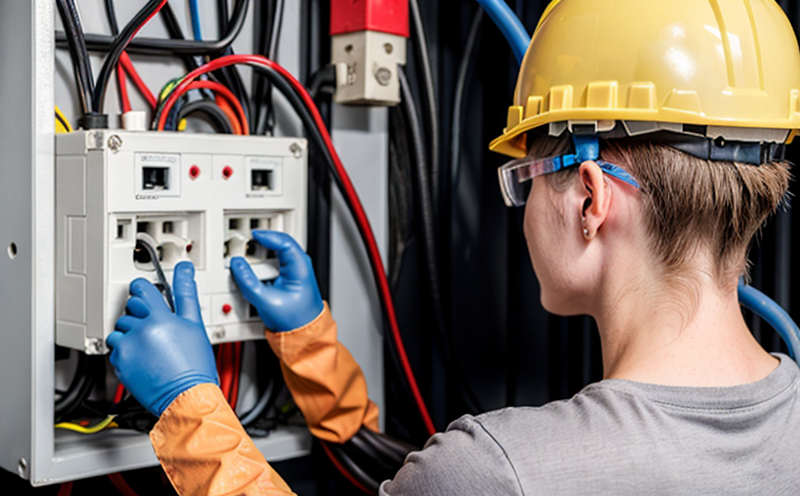IEC 60730 Automatic Electrical Control Systems in Smart Home Devices
The IEC 60730 standard is a pivotal document that addresses the safety and performance requirements for automatic electrical control systems. In the context of smart home devices, this standard ensures that these intricate systems are designed and manufactured to meet rigorous international safety standards. This service focuses on testing smart home appliances like thermostats, lighting controllers, security systems, and other automated components.
Smart home devices rely heavily on automatic electrical control systems for their operation. These systems must be reliable, safe, and compliant with global regulations to ensure the well-being of users. The IEC 60730 standard encompasses various aspects including electromagnetic compatibility (EMC), safety requirements, and performance criteria. Compliance with this standard is crucial not only for product safety but also for market access in numerous countries.
The testing procedure involves multiple stages that ensure the automatic electrical control systems function correctly under different conditions. This includes initial factory tests to verify basic functionality and compliance with specifications; type test for confirming design consistency across production runs; and final acceptance tests conducted at the point of sale or installation. These rigorous checks are essential in preventing potential hazards associated with faulty controls.
The standard specifies detailed procedures and criteria for evaluating automatic control systems based on their intended use. For instance, for a smart thermostat, it would assess how well the device maintains temperature within specified limits when power supply fluctuates. Similarly, for lighting controllers, it checks if they can handle dimming commands accurately without causing malfunctions or safety issues.
One of the key challenges in testing these systems is ensuring that all functionalities are tested under real-world scenarios. This necessitates sophisticated test equipment capable of simulating various environmental factors such as temperature extremes, humidity levels, and voltage variations. Additionally, it requires specialized software to interpret results accurately against set parameters outlined by IEC 60730.
Compliance with this standard not only enhances product reliability but also builds consumer confidence in smart home technology products. By adhering strictly to these guidelines during manufacturing processes, manufacturers demonstrate their commitment to quality assurance practices which ultimately lead to safer and more efficient use of smart home devices.
Benefits
Compliance with IEC 60730 brings numerous advantages both for the manufacturer and end-users. Firstly, it ensures that your products meet international safety standards which is essential for gaining market access in various countries. Secondly, compliance can significantly reduce liability risks by minimizing potential hazards related to faulty electrical control systems. Thirdly, it enhances brand reputation as adherence to such stringent regulations showcases a company's dedication towards producing high-quality goods.
From an operational perspective, meeting these standards helps streamline the product development process by providing clear guidelines during design stages. It also facilitates easier integration into existing systems within smart homes due to consistent performance across different brands and models. Lastly but importantly, compliance fosters trust between consumers and businesses, encouraging wider adoption of advanced home automation technologies.
Eurolab Advantages
At Eurolab, we pride ourselves on offering comprehensive services that cater specifically to the needs of our clients operating in diverse sectors. Our expertise lies in providing accurate and reliable testing solutions for smart home devices following IEC 60730 standards.
We have state-of-the-art facilities equipped with cutting-edge equipment necessary for conducting thorough tests on automatic electrical control systems used in these devices. Our team comprises highly skilled professionals who understand the nuances of this standard, ensuring precise interpretations and accurate results during testing processes.
Our commitment to excellence extends beyond mere compliance; we strive to offer valuable insights through detailed reports that guide manufacturers towards continuous improvement of their products. By leveraging our extensive experience in handling similar projects across various industries, Eurolab ensures seamless integration into any existing workflow without causing disruptions.
Why Choose This Test
Selecting IEC 60730 testing for your smart home device is a strategic decision that guarantees robust performance and unwavering adherence to international standards. It ensures not only the safety of users but also opens doors to broader market penetration.
The rigorous nature of this test underscores its importance in identifying any latent defects early on, thus preventing costly recalls later down the line. Furthermore, it helps maintain consistency throughout production batches ensuring uniform quality across all units produced. This consistency is particularly crucial given the complex and interconnected nature of smart home systems where even minor discrepancies could lead to significant malfunctions.
Moreover, compliance with this standard demonstrates a strong commitment towards maintaining high standards of product integrity, thereby enhancing consumer confidence in your brand. In today’s competitive market, such credibility can be a decisive factor influencing purchasing decisions and fostering long-term customer relationships.





